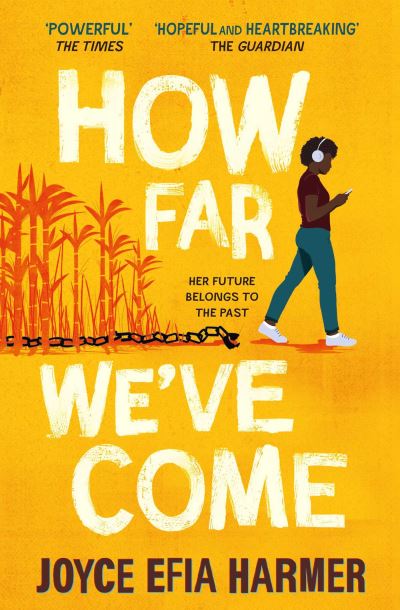
Interesting, original, thought-provoking - this book tells the story of Obah and Jacob. What would a Black slave from 19th century think of the 21st century? What difference can descendants of slave owners make?
What an interesting and original read. It really made me think and I would totally recommend this book. It follows the story of Obah, a Black slave working on a plantation in Barbados in 1834. One day she meets a White boy, Jacob, from… the future!!!! Jacob has found a way to travel back in time from the present day and is horrified by what he sees and how Obah is treated. Jacob begs Obah to travel back to the future with him. She doesn’t want to leave her friends, but finds she is forced to flee and takes up Jacob’s escape route. At first, Obah is delighted by a perceived equality in the modern world and is desperate for her friends to join her in the future. However, she begins to realise all is not what it first seems. How can she and Jacob best help her friends?
An interesting book to make you think and feel all the emotions - a rollercoaster of emotions to make you question things and appreciate the people in your life.
This is an unusual book that takes you on a wild ride through a world, different but similar to ours, about people and their feelings! The story follows different characters and how they deal with problems life throws at them. The writing is intense and you will feel connected to the people, experiencing everything they are going through. The underlying theme of the changing world will make you think about whether progress is always a good thing.
This book is a heartbreaking tale of sorrow and hope, teaching important lessons to readers in the modern day.
How Far We’ve Come is a story of hope and of sorrow, it highlights the issues we in the modern day face and see as simple facts of life. It teaches that although we believe that our society is much better than the past, people still face many injustices and issues which are just as damaging as those faced by those who came before us. This book tells a story of fear, fear that many still deal with everyday, however, it is still a tale of hope, it displays that hope for our society and how it may be in the future.
This is an important YA debut novel with a powerful plot.
How Far We've Come has a powerful plot, simultaneously set in the disparate worlds of 1834 Barbados, narrated by a black female protagonist (Obah), and 21st Century England, through the eyes of a white teenage boy (Jacob). It uses the same timeslip device as Octavia Butler does in Kindred, but in a more skillful and compelling way, and presents the opportunity to reflect on how far we have, (or haven’t) progressed since the 19th Century.
Obah’s voice seems authentic and well-developed, and provides a gripping and important perspective from which to consider this painful part of history. It is initially intriguing to see how Obah reacts to the completely foreign 21st Century landscape with: electricity, running water, drones and relative equality, but I felt myself wanting to return to the past to find out more about how the Barbados story would unfold, predicting the downfall of the barbaric white plantation owners in a variety of humiliating and gruesome ways.
Juxtaposing the two worlds helps emphasise how we have moved forward towards an improved sense of humanity, whilst allowing us to consider how the attitudes of the past still linger in the fabric of our modern world. Although it is laden with heavy-handed ‘white guilt’, it highlights the way our modern culture is built on inequality and exploitation, and reminds us we still have a lot of work to do. This is an important YA debut novel.
A unique idea, of a time traveller who gets to compare two different times to see if things have really got better over hundreds of years or not. The characters are beautifully formed and Obah's sense of discomfort, longing and fear are well described.
This is quite frankly an amazing book. A unique idea, of a time traveller who gets to compare two different times to see if things have really got better over hundreds of years or not. I would like to think so. I have to say that I was put off a little at first because in the author's note at the beginning, Mrs Harmer states that there is a side to British History that isn't told in schools. I think great strides have been made in teaching about brilliant black voices from the past over the last 15/20 years. It would be fascinating to go forward another 200 years from today to see what the world and social justice are like. The characters are beautifully formed and Obah's sense of discomfort, longing and fear are well described. I like how, through her experiences, she gradually becomes a force to be reckoned with, compared to the relatively and understandably meek person we meet at the beginning. Some of the circumstances and situations are truly eye-opening and sometimes discomforting to read about - how could life really have been like that for some people? However, there is definitely a positive sense of hope and belief running through the author's note and the story itself. Hopefully, it does inspire some young people to take up the torch and fight for injustice in the future, as there is still more to do and we owe to all those, like Obah who started the fight so many years ago.